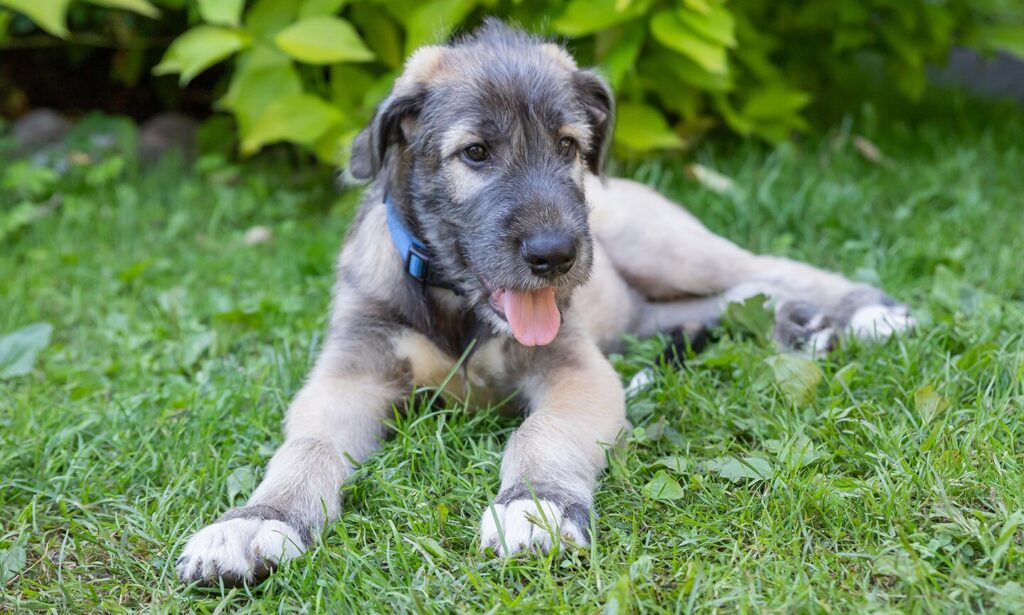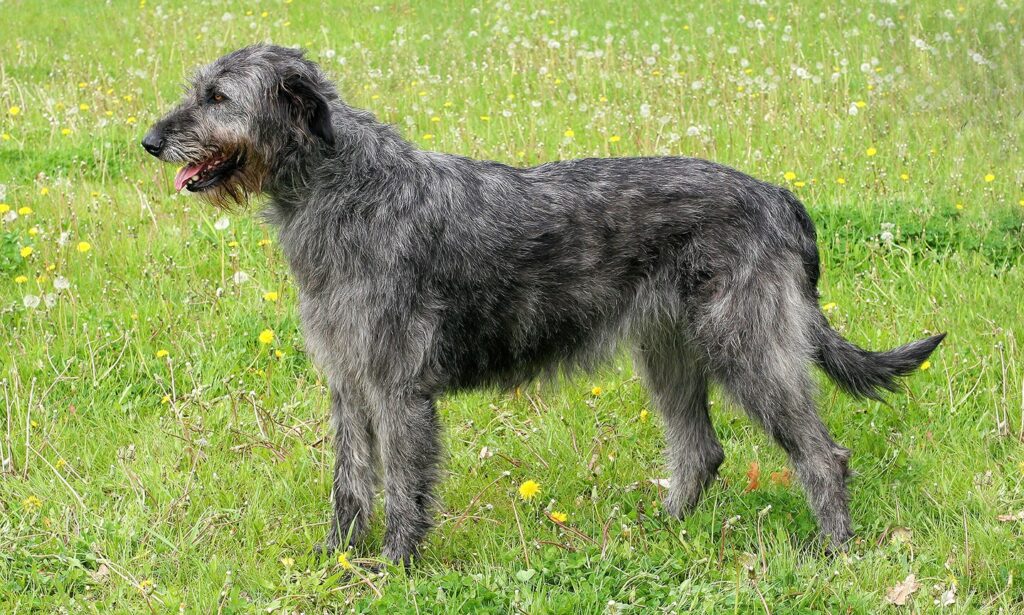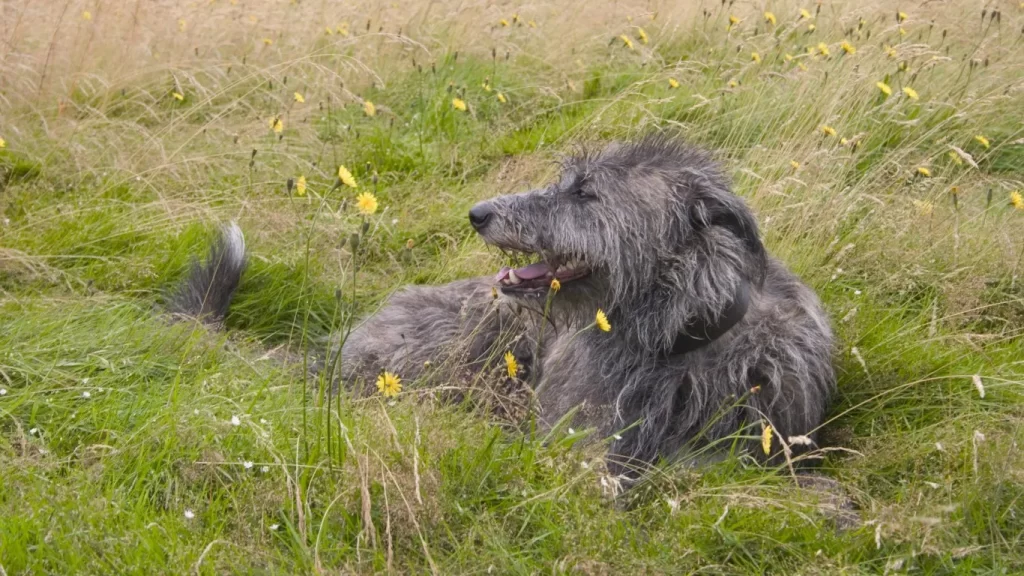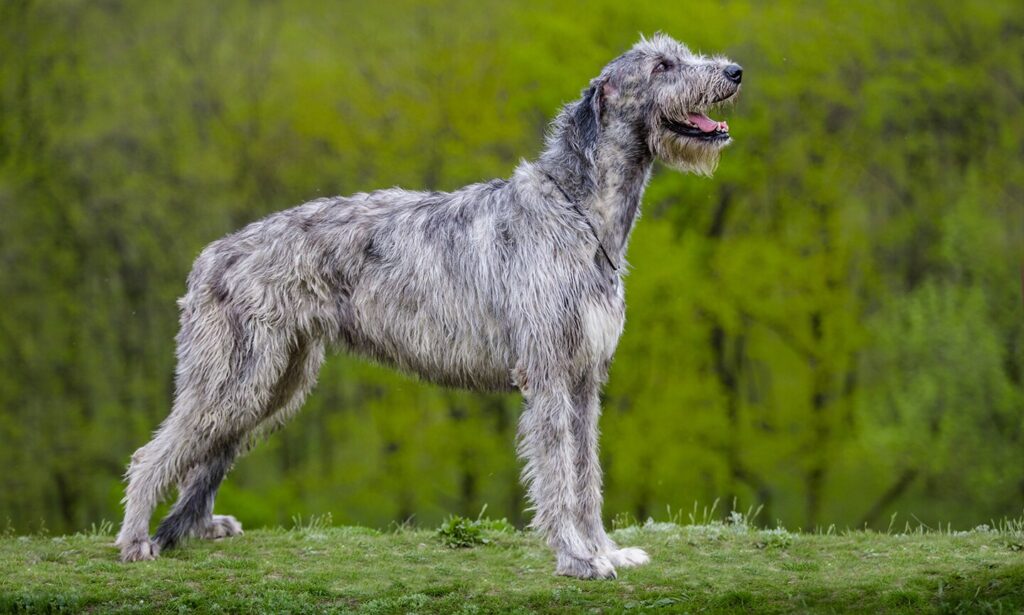Irish Wolfhound Watch: comprensión y gestión de problemas de salud clave en la raza
Tabla de contenido
Introduction to Irish Wolfhounds: A Majestic Breed with Unique Needs
The Irish Wolfhound, a breed that seems to have leaped out of the rich tapestry of medieval Irish lore, stands as a gentle giant in the canine world. With their towering stature and noble demeanor, these dogs carry a legacy that is as grand as their size. However, owning an Irish Wolfhound is not just about enjoying their majestic presence; it’s a journey that requires a deep understanding of their health and well-being.
Irish Wolfhounds are not just pets; they are a part of history, a living link to a past where they were revered for their hunting prowess and cherished for their loyalty. Despite their formidable appearance, they are known for their gentle and affectionate nature, making them excellent companions. Yet, their large size comes with a set of challenges, particularly regarding their health. The lifespan of an Irish Wolfhound is notably shorter than many other breeds, averaging around 6 to 8 years, which makes understanding and addressing their health concerns even more crucial for any owner.
This breed’s health concerns are not just a matter for individual owners but a topic of interest for anyone who admires these gentle giants. Whether you are a current owner, considering adding an Irish Wolfhound to your family, or simply fascinated by this noble breed, gaining insight into their health issues is essential. This article aims to provide a comprehensive guide to the common health concerns faced by Irish Wolfhounds, preventive measures, the impact of lifestyle choices, and much more, to help you ensure the best quality of life for these magnificent dogs.
In the following sections, we will delve into the common health issues that Irish Wolfhounds face, discuss preventive measures to keep them healthy, explore the role of genetic testing, examine the impact of lifestyle on their health, and share real-life case studies. We will also provide an overview of the costs associated with treating these health issues and conclude with answers to some frequently asked questions. This article is your guide to understanding and nurturing the health of one of the most majestic breeds in the canine kingdom.
Common Health Issues in Irish Wolfhounds
Irish Wolfhounds, known for their grandeur and gentle nature, unfortunately face several health challenges. Understanding these issues is vital for any owner who wishes to ensure their pet’s well-being.
Cardiopatía
Heart disease, particularly cardiomyopathy, is a significant concern in Irish Wolfhounds. This condition, characterized by an enlarged heart, can lead to serious complications if not detected and managed early. Regular veterinary check-ups, including heart screenings, are crucial for early detection and treatment.
Cancer
Cancer, especially osteosarcoma (bone cancer) and lymphoma, is another major health threat to Irish Wolfhounds. These cancers can be aggressive and require prompt veterinary attention. Understanding the symptoms, such as unexplained lameness or swelling, can help in early diagnosis and treatment.
Inflar
Bloat, or gastric torsion, is a life-threatening condition common in large breeds like the Irish Wolfhound. It occurs when the stomach fills with gas and twists on itself, requiring immediate veterinary intervention. Awareness of the symptoms, such as a swollen abdomen and distress, is key to saving your dog’s life in such emergencies.
Orthopedic Problems
Due to their large size, Irish Wolfhounds are prone to orthopedic issues like hip and elbow dysplasia. These conditions can lead to arthritis and mobility problems. Regular exercise, maintaining a healthy weight, and veterinary check-ups can help manage these issues.
Liver Disease
Liver shunt, a serious form of liver disease, is a concern in Irish Wolfhounds. It may require surgical intervention and lifelong management. Early detection through regular health screenings is vital for effective treatment.
Eye Disease
Progressive retinal atrophy (PRA) and cataracts are common eye diseases in Irish Wolfhounds, leading to vision loss if untreated. Regular eye exams can help in early detection and treatment.
Skin Problems
Irish Wolfhounds can suffer from skin issues like allergies and pyoderma. Maintaining good hygiene and regular veterinary check-ups can help manage these conditions.
Understanding these health issues is the first step in providing the best care for your Irish Wolfhound. Regular veterinary visits, a balanced diet, and a healthy lifestyle are key to managing these conditions and ensuring a quality life for your gentle giant.
Preventive Measures for Health Issues in Irish Wolfhounds
Preventive care is crucial in maintaining the health and longevity of Irish Wolfhounds. By understanding and implementing effective preventive strategies, owners can significantly reduce the risk of common health issues in their pets.
Regular Veterinary Check-Ups
Regular veterinary visits are essential for early detection and management of health issues. These check-ups should include heart screenings, orthopedic evaluations, liver function tests, and eye exams. Early detection often leads to more effective treatment and better outcomes.
Balanced Diet and Nutrition
A well-balanced diet tailored to the specific needs of Irish Wolfhounds is vital. Given their size and growth patterns, they require a diet that supports bone and joint health and prevents obesity, a risk factor for many health issues. Consult with a veterinarian to determine the best diet plan for your dog.
Exercise and Weight Management
Regular exercise is crucial for maintaining a healthy weight and supporting joint health. However, it’s important to balance exercise with rest, especially in growing puppies, to prevent stress on developing bones and joints. Avoid excessive exercise and provide a comfortable resting area to prevent calluses and joint stress.
Bloat Prevention
To reduce the risk of bloat, feed your Irish Wolfhound smaller, more frequent meals and avoid vigorous exercise around meal times. Elevated feeding stations are often recommended, but consult with your vet as opinions on their effectiveness vary.
Cuidado dental
Regular dental care, including teeth brushing and professional cleanings, can prevent dental diseases, which can impact overall health.
Estimulación mental
Mental stimulation is as important as physical exercise. It helps prevent boredom and stress, which can lead to destructive behaviors and exacerbate health issues. Provide interactive toys, training sessions, and socialization opportunities.
Parasite Control
Regular parasite control, including flea, tick, and worm treatments, is essential to prevent a range of health issues that can stem from parasite infestations.
By implementing these preventive measures, you can help ensure your Irish Wolfhound lives a longer, healthier life. Remember, preventive care is not just about avoiding illness; it’s about enhancing the overall quality of life for your beloved pet.
The Role of Genetic Testing in Irish Wolfhounds’ Health
Genetic testing plays a pivotal role in understanding and managing the health of Irish Wolfhounds. By identifying potential hereditary conditions, owners and breeders can make informed decisions about their dogs’ health and breeding practices.
Understanding Genetic Testing
Genetic testing involves analyzing a dog’s DNA to identify specific genetic markers associated with certain diseases. For Irish Wolfhounds, this can include tests for conditions like cardiomyopathy, hip and elbow dysplasia, and eye disorders. Knowing a dog’s genetic makeup can help predict and prevent the development of these conditions.
Benefits of Genetic Testing
- Detección temprana: Identifying a predisposition to certain diseases allows for early monitoring and intervention, which can significantly improve the dog’s quality of life.
- Informed Breeding Decisions: Breeders can use genetic testing to select breeding pairs that are less likely to produce offspring with specific hereditary conditions, thereby improving the overall health of the breed.
- Personalized Care Plans: Knowing a dog’s genetic risks enables veterinarians to create personalized care and monitoring plans, tailored to the specific needs of the dog.
How to Get Your Dog Tested
Genetic testing is typically done through a simple blood test or cheek swab. Many veterinary
offices offer genetic testing services, or you can order a test kit from a reputable company specializing in canine genetics. Once you collect the sample, it’s sent to a lab for analysis, and the results are usually available within a few weeks.
Interpreting the Results
It’s important to discuss the results of genetic tests with your veterinarian. They can help interpret the findings and advise on any necessary follow-up actions or preventive measures. Remember, a positive result for a genetic marker does not guarantee your dog will develop the condition, but it does indicate a higher risk.
Limitations of Genetic Testing
While genetic testing provides valuable insights, it’s not a crystal ball. Not all health issues can be predicted through genetics, and environmental factors also play a significant role in a dog’s overall health. Additionally, the field of canine genetics is still evolving, and not all genetic markers for diseases are known or available for testing.
In conclusion, genetic testing is a powerful tool in the proactive management of Irish Wolfhounds’ health. It offers insights that can lead to better health outcomes and informs breeding decisions to ensure the longevity and well-being of this magnificent breed.
The Impact of Lifestyle on the Health of Irish Wolfhounds
The lifestyle choices we make for our Irish Wolfhounds can have a profound impact on their health and longevity. Understanding how daily habits and environmental factors contribute to their well-being is crucial for any responsible owner.
Diet and Nutrition
A balanced diet is fundamental to maintaining the health of an Irish Wolfhound. Given their size, these dogs have specific nutritional needs to support their bone structure and overall health. High-quality food that is appropriate for their age, size, and activity level is essential. Avoid overfeeding and monitor their weight regularly to prevent obesity, which can exacerbate health issues like joint problems and heart disease.
Exercise and Physical Activity
Irish Wolfhounds require regular exercise to maintain their physical health and mental well-being. However, it’s important to balance their activity levels, especially during their rapid growth phase as puppies. Excessive exercise can harm developing joints, so it’s crucial to provide appropriate and controlled physical activities. As adults, they enjoy walks, gentle runs, and playtime, but always within their physical limits.
Estimulación mental
Mental health is as important as physical health. Irish Wolfhounds are intelligent dogs and thrive on mental stimulation. Puzzle toys, training sessions, and social interactions can keep their minds active and prevent boredom, which can lead to destructive behaviors.
Factores ambientales
The living environment plays a significant role in the health of Irish Wolfhounds. They need a comfortable and safe space to rest, away from extreme weather conditions. Due to their size, they benefit from a living space that allows them to move freely without the risk of injury.
Regular Health Check-Ups
A proactive approach to health care, including regular veterinary check-ups, vaccinations, and parasite control
, is essential for early detection and management of potential health issues. Routine visits to the vet can help catch problems before they become serious, ensuring your Irish Wolfhound stays healthy and happy.
Stress and Anxiety Management
Like all dogs, Irish Wolfhounds can experience stress and anxiety, which can impact their overall health. Providing a stable and loving environment, along with consistent routines, can help reduce stress. Training and socialization from a young age also play a crucial role in developing a well-adjusted and confident dog.
Grooming and Hygiene
Regular grooming is not just about keeping your Irish Wolfhound looking good; it’s also crucial for their health. Brushing their coat helps to remove dirt, prevent matting, and reduce shedding. It’s also an opportunity to check for any skin issues or parasites. Regular nail trimming, ear cleaning, and dental care are also important to prevent infections and other health problems.
In summary, the lifestyle we provide for our Irish Wolfhounds significantly influences their health. A balanced diet, appropriate exercise, mental stimulation, a healthy living environment, regular veterinary care, and good grooming practices are all key components in ensuring the well-being of these gentle giants.
Case Studies: Real-Life Health Scenarios in Irish Wolfhounds
Exploring real-life case studies provides valuable insights into the health challenges faced by Irish Wolfhounds and the effectiveness of various treatments and preventive measures. These stories can offer practical lessons and hope to owners navigating similar situations.
Case Study 1: Managing Cardiomyopathy
Max, a 5-year-old Irish Wolfhound, was diagnosed with early-stage cardiomyopathy during a routine vet check-up. His owner noticed he was less energetic and occasionally coughed after exercise. After diagnosis, Max was put on a regimen of heart medications and a special diet. Regular follow-ups showed improvement in his heart function, and Max continued to live a comfortable life with manageable activity levels.
Case Study 2: Overcoming Osteosarcoma
Bella, an 8-year-old Irish Wolfhound, started limping on her front leg. X-rays revealed osteosarcoma. Her owner opted for limb amputation followed by chemotherapy. Post-surgery, Bella adapted well to three legs and completed her chemotherapy with minimal side effects. Regular check-ups showed no signs of cancer spread, and Bella enjoyed a good quality of life post-treatment.
Case Study 3: Bloat Emergency
Sam, a 6-year-old Irish Wolfhound, suddenly became restless one evening, with a swollen abdomen. Recognizing the signs of bloat, his owner rushed him to the emergency vet. Sam underwent surgery to correct the gastric torsion and had a preventive gastropexy. Post-recovery, his diet was adjusted to smaller, more frequent meals, and his exercise routine was carefully managed to prevent recurrence.
Case Study 4: Hip Dysplasia Management
Luna, a 3-year-old Irish Wolfhound, was diagnosed with hip dysplasia. Her treatment included weight management, joint supplements, and a tailored exercise program. Luna’s condition was managed successfully without the need for surgery, and she continued to enjoy her daily walks and playtime, albeit at a gentler pace.
Case Study 5: Liver Shunt Correction
Oliver, a 1-year-old Irish Wolfhound, exhibited stunted growth and occasional disorientation. After thorough testing, he was diagnosed with a liver shunt. Oliver underwent surgery to correct the shunt, followed by a special diet and medication. Post-surgery, he showed remarkable improvement in growth and behavior. Regular veterinary check-ups ensured that Oliver’s liver function remained normal, allowing him to lead a healthy and active life.
These case studies highlight the importance of early detection, prompt veterinary care, and the adaptability of Irish Wolfhounds to various treatments. They also underscore the resilience of this breed and the crucial role of owners in managing their health. Each story is a testament to the bond between Irish Wolfhounds and their owners and the commitment to providing the best care possible.
The Cost of Treating Common Health Issues in Irish Wolfhounds
Understanding the potential costs associated with treating health issues in Irish Wolfhounds is crucial for owners. It helps in preparing financially for the care and treatment these large dogs may require throughout their lives.
Heart Disease Treatment Costs
Treating heart disease, such as cardiomyopathy, can involve ongoing expenses for medications, special diets, and regular veterinary check-ups, including cardiac monitoring. The cost can range from moderate to high, depending on the severity of the condition and the required treatment plan.
Cancer Treatment Expenses
The cost of treating cancer, like osteosarcoma, can be significant. It may include surgery, chemotherapy, and follow-up care. In cases where limb amputation is necessary, additional costs for rehabilitation and adapting the living environment for the dog’s comfort may be incurred.
Bloat Surgery and Aftercare
Emergency treatment for bloat, including surgery and aftercare, can be expensive. The cost varies depending on the severity of the condition and the specific treatment required. Preventive measures, such as gastropexy, also involve surgical costs but can be life-saving and cost-effective in the long run.
Orthopedic Treatments
Managing conditions like hip dysplasia may involve surgery, physical therapy, pain management, and lifestyle modifications. The costs can vary widely based on the treatment approach, from conservative management with medication and supplements to more expensive surgical interventions.
Liver Shunt Surgery and Management
The cost of diagnosing and surgically correcting a liver shunt can be high, but it is often a one-time expense that significantly improves the dog’s quality of life. Post-surgery, the costs may include special diets and medications.
Preventive Care and Insurance
Investing in regular preventive care, such as vaccinations, parasite control, and routine check-ups, can help avoid some of these costly health issues. Additionally, pet health insurance can be a valuable investment to help manage the financial burden of unexpected health problems.
In conclusion, while the cost of treating health issues in Irish Wolfhounds can be considerable, proactive health management and planning can help mitigate these expenses. It’s important for owners to be aware of these potential costs and consider options like pet insurance to ensure their Irish Wolfhound receives the best possible care.
Embracing the Journey with Your Irish Wolfhound
Caring for an Irish Wolfhound is a journey filled with both challenges and immense rewards. These gentle giants, with their noble demeanor and affectionate nature, bring a unique presence into the lives of their owners. However, as we have explored in this comprehensive guide, their care demands a deep understanding of their health needs, a commitment to preventive measures, and a readiness to address potential health issues.
The key to nurturing a healthy Irish Wolfhound lies in regular veterinary check-ups, a balanced diet, appropriate exercise, and mental stimulation. Owners should be vigilant about the signs of common health issues like heart disease, cancer, bloat, and joint problems, and take proactive steps to prevent them. Genetic testing, while not a complete predictor of health, can be a valuable tool in understanding and managing breed-specific concerns.
Financial planning, including considering the costs of treatment and the option of pet insurance, is also an important aspect of responsible ownership. It ensures that your Irish Wolfhound can receive the best possible care throughout its life.
Ultimately, the bond between an Irish Wolfhound and its owner is built on love, understanding, and care. By embracing the responsibilities that come with owning this magnificent breed, you can ensure that your Irish Wolfhound lives a life full of health, happiness, and companionship. Remember, each day with your Irish Wolfhound is an opportunity to create lasting memories and a deep, enduring bond.
Preguntas frecuentes
What is the average lifespan of an Irish Wolfhound?
The average lifespan of an Irish Wolfhound is typically around 6 to 8 years. However, with proper care, regular veterinary check-ups, and a healthy lifestyle, some Irish Wolfhounds can live longer.
Can genetic testing predict all health issues in Irish Wolfhounds?
While genetic testing can identify a predisposition to certain health conditions, it does not predict all potential health issues. Environmental factors and lifestyle choices also play a significant role in a dog’s overall health.
How can I prevent bloat in my Irish Wolfhound?
To reduce the risk of bloat, feed smaller, more frequent meals, avoid vigorous exercise around feeding times, and consider a preventive gastropexy surgery, especially if your dog has a family history of bloat.
Are Irish Wolfhounds prone to any specific type of cancer?
Irish Wolfhounds are particularly prone to osteosarcoma, a type of bone cancer. Early detection through regular vet visits and awareness of symptoms like lameness can aid in early treatment.
Is pet insurance worth it for an Irish Wolfhound?
Given the potential high costs of treating health issues common in Irish Wolfhounds, pet insurance can be a wise investment to help manage unexpected veterinary expenses.
Acerca de Mateo
Matthew es un autor dedicado en Dress Up Your Pup, donde combina su pasión por la moda con su amor por nuestros amigos de cuatro patas. Con años de experiencia como voluntario desde hace mucho tiempo en su sociedad humanitaria local, Matt aporta una combinación única de experiencia en cuidado canino y tendencias de estilo. Sus artículos tienen como objetivo inspirar a los dueños de perros a encontrar el estilo perfecto para sus compañeros peludos al tiempo que enfatizan la comodidad y la seguridad. Cuando no está escribiendo, se puede encontrar a Matt en la sociedad humanitaria, ayudando a los perros a encontrar un hogar definitivo. Siga a Matt para mantenerse actualizado sobre lo último en moda para perros y consejos sobre el cuidado de las mascotas.





